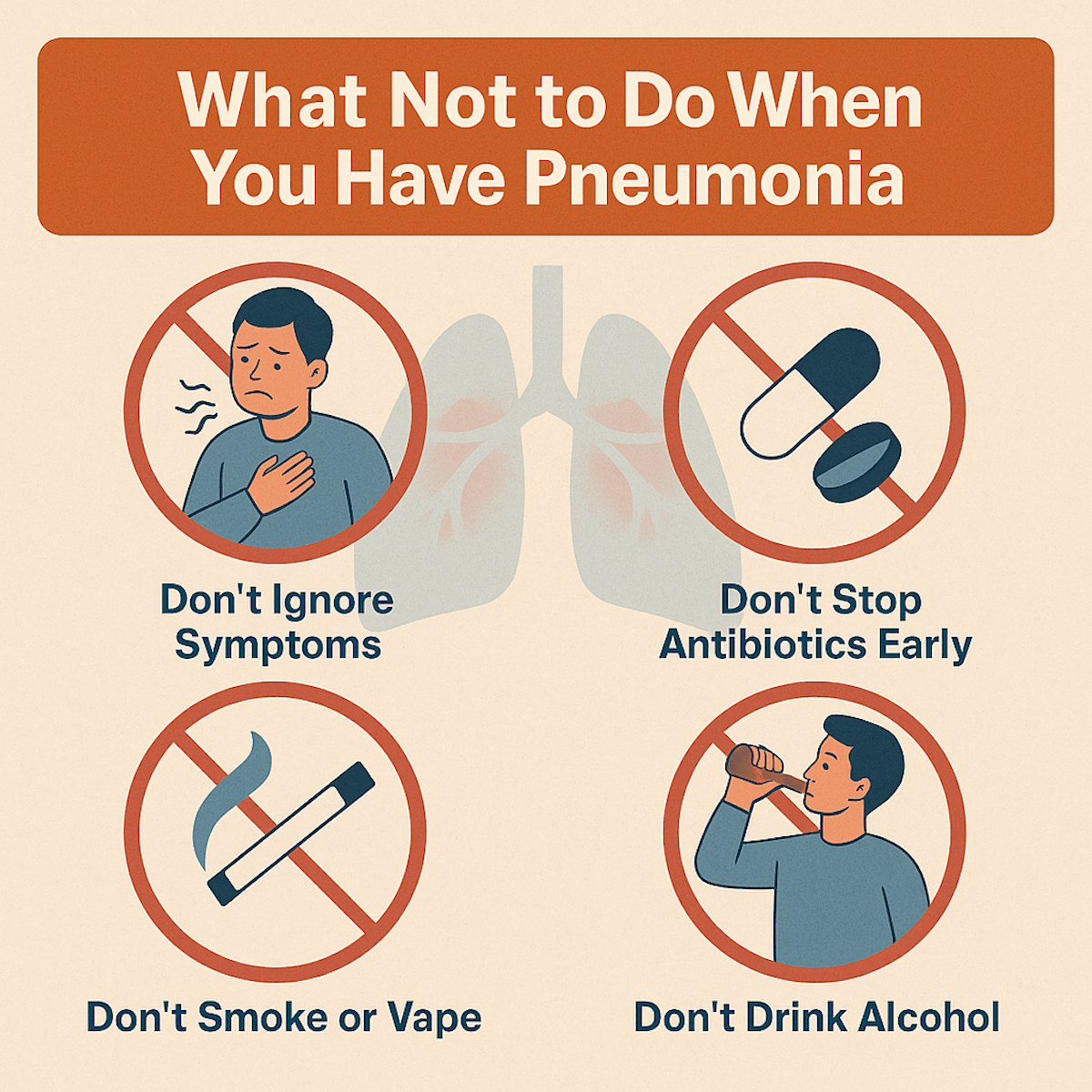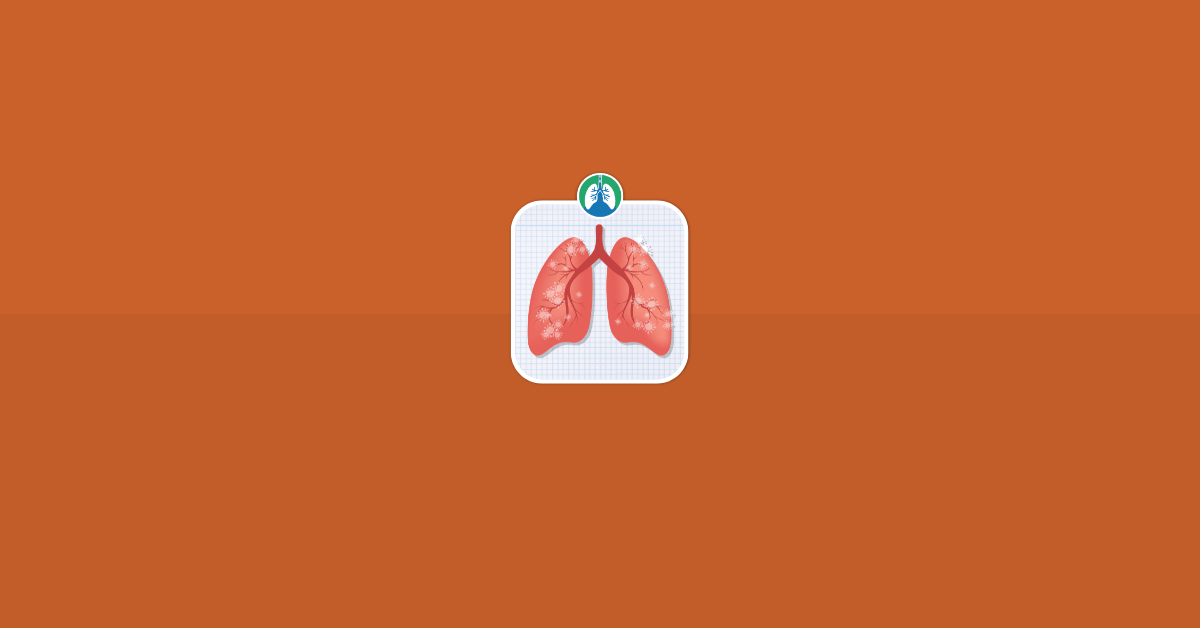Pneumonia is a serious lung infection that can make even the simplest tasks, like breathing or walking across the room, feel exhausting. While proper medical treatment is the cornerstone of recovery, your daily choices can also play a major role in how quickly and fully you heal.
Many people unknowingly slow down their recovery—or even put themselves at risk for complications—by making simple but harmful mistakes during the healing process.
Understanding what not to do when you have pneumonia is just as important as knowing what treatments to follow. This article explores the common pitfalls to avoid for a safer recovery.
Download our free guide that has over 100+ of the best tips for healthy lungs.
What Not to Do When You Have Pneumonia?
When you have pneumonia, it’s just as important to know what not to do as it is to follow your treatment plan. Avoid ignoring symptoms like chest pain, fever, or worsening shortness of breath, as these may signal complications that require urgent care.
Never stop antibiotics early, since this can lead to recurrence or antibiotic resistance. Don’t rely solely on home remedies—medical treatment is often essential. Smoking, vaping, and alcohol should be avoided because they irritate the lungs, weaken immunity, and slow recovery.
Overexertion is another mistake, as your body needs rest to heal. Finally, don’t skip follow-up appointments or proper hydration, both of which help ensure your lungs recover fully and reduce the risk of long-term issues.

Mistakes to Avoid During Pneumonia Recovery
Watch this video and keep reading to learn more about what not to do when you have pneumonia and how to support a safe recovery.
1. Don’t Ignore Symptoms
One of the most dangerous mistakes people make with pneumonia is ignoring or downplaying symptoms. Pneumonia can start off feeling like a bad cold or flu, but it can quickly escalate into a serious condition. Warning signs include persistent cough, chest pain, difficulty breathing, high fever, chills, and fatigue.
If these symptoms worsen or fail to improve within a few days, medical evaluation is critical. In severe cases, untreated pneumonia can lead to respiratory failure, sepsis, or even death.
Note: Seeking medical attention early ensures that you get the proper treatment before complications arise, making recovery smoother and less risky.
2. Don’t Stop Antibiotics Early
If your doctor prescribes antibiotics for bacterial pneumonia, it’s important to complete the full course, even if you start feeling better after just a few days. Stopping medication early may leave some bacteria alive, allowing the infection to come back stronger and potentially resistant to treatment.
Antibiotic resistance is a growing global issue, and incomplete treatment contributes significantly to this problem. By finishing your prescribed course, you give your body the best chance at fully clearing the infection.
Note: Always follow your provider’s instructions carefully, and if side effects occur, consult them before making any changes to your medication plan.
3. Don’t Rely Only on Home Remedies
While supportive measures such as rest, fluids, warm teas, and humidified air can bring comfort, they should never replace medical treatment when it comes to pneumonia. Some people delay seeing a healthcare professional, hoping natural remedies will be enough.
This can be dangerous because pneumonia often requires antibiotics, antivirals, or other prescribed medications depending on its cause. Left untreated, the infection can worsen, leading to serious complications like lung abscesses or hospitalization.
Note: Home remedies are best used as a complement to professional care, not a substitute. Consulting a doctor ensures you get the right diagnosis and treatment plan.
4. Don’t Smoke or Vape
Smoking and vaping are especially harmful when you have pneumonia because they irritate the lungs and weaken your body’s ability to heal. Cigarette smoke contains toxins that damage lung tissue, impair immune defenses, and slow the clearance of mucus and infection. Vaping, though sometimes thought of as safer, also delivers chemicals that inflame the airways and can worsen breathing difficulties.
Continuing these habits during pneumonia increases your risk of complications, such as chronic lung damage or prolonged illness. Quitting, at least temporarily while you recover, gives your lungs the best chance to heal and reduces the likelihood of recurring respiratory problems.
5. Don’t Drink Alcohol
Alcohol is another substance that can hinder recovery from pneumonia. Drinking while sick suppresses the immune system, making it harder for your body to fight off infection. It also interferes with the effectiveness of antibiotics and other prescribed medications.
Alcohol dehydrates the body, which thickens mucus and makes coughing less effective at clearing the lungs. In addition, alcohol use can increase fatigue and reduce the quality of sleep, both of which are crucial for healing.
Note: Avoiding alcohol until you are fully recovered helps support your immune system, keeps your treatment on track, and prevents complications that could worsen your condition.
6. Don’t Overexert Yourself
Many people make the mistake of returning to strenuous activity too soon after being diagnosed with pneumonia. The infection already places significant stress on the lungs and body, and overexertion can worsen symptoms such as shortness of breath, fatigue, and chest pain. Physical strain diverts energy away from healing, slowing recovery and raising the risk of relapse or complications.
Even if you start to feel better, your lungs may still be inflamed and vulnerable. Instead of rushing back into exercise or work, focus on gradual rest and light activity as recommended by your healthcare provider to promote safe, steady recovery.
7. Don’t Skip Follow-Up Appointments
Once you begin recovering from pneumonia, it may be tempting to skip follow-up visits with your healthcare provider, especially if you’re feeling better. However, these appointments are important because pneumonia can sometimes leave lingering effects, such as scarring, fluid in the lungs, or decreased lung function.
Doctors may order chest X-rays, lung function tests, or blood work to ensure the infection has fully cleared. Skipping these visits could mean missing complications that develop silently.
Note: Attending follow-up care allows your provider to monitor your progress, adjust treatment if necessary, and give you guidance on when it’s safe to return to normal activities.
8. Don’t Share Utensils or Skip Hygiene
Certain types of pneumonia are contagious, spreading through droplets when an infected person coughs or sneezes. Sharing cups, utensils, or personal items increases the risk of passing germs to others. Poor hand hygiene also allows bacteria or viruses to spread more easily within households.
If you have pneumonia, protect those around you by practicing good hygiene, covering your mouth when coughing, and washing your hands frequently. Avoid sharing personal items until your doctor confirms you are no longer contagious. These steps help prevent others—especially vulnerable individuals like children, the elderly, or those with chronic illnesses—from developing respiratory infections.
9. Don’t Delay Rest and Sleep
Rest and sleep are vital for recovery when battling pneumonia. Your immune system works hardest when your body is at rest, repairing tissue and fighting infection. Many people make the mistake of trying to “push through” pneumonia by continuing to work, exercise, or stay active, but this can actually prolong the illness.
Overexertion weakens your body, increases fatigue, and worsens lung inflammation. Sleep deprivation, even for a few nights, can significantly reduce immune function.
Note: By prioritizing rest, naps, and uninterrupted sleep, you give your body the energy and time it needs to recover fully and avoid dangerous setbacks.
10. Don’t Skip Hydration
Staying hydrated is essential for keeping mucus thin and easier to clear from the lungs. When you don’t drink enough fluids, mucus becomes thick and sticky, making coughing less effective and allowing infection to linger. Dehydration can also cause fatigue, dizziness, and headaches, which further weaken your body during recovery.
Water, herbal teas, and broths are excellent options to stay hydrated. Avoid excessive caffeine or alcohol, as they can contribute to dehydration.
Note: Maintaining proper hydration supports immune function, eases breathing, and speeds up the healing process, giving your lungs the best chance to fully recover from pneumonia.
FAQs About Recovering From Pneumonia
What Activities Should You Avoid With Pneumonia?
When you have pneumonia, avoid strenuous activities such as heavy lifting, intense exercise, or long hours of work. These can put unnecessary stress on your lungs and body, slowing down recovery. It is also important to avoid smoking or vaping, which irritates the lungs, and drinking alcohol, which weakens your immune system.
Social activities should be limited until you are no longer contagious to protect others. Resting and allowing your body to heal is the best way to recover safely.
What Can Make Pneumonia Worse?
Several factors can make pneumonia worse, including ignoring symptoms, delaying medical care, or stopping prescribed antibiotics too early. Smoking, vaping, and alcohol consumption irritate the lungs and weaken immune function, leading to slower healing.
Overexerting yourself, neglecting rest, or failing to stay hydrated can also worsen symptoms and prolong the illness. In some cases, exposure to cold or polluted environments may aggravate breathing problems. To prevent complications, it is essential to follow medical advice closely and avoid harmful behaviors during recovery.
Is It Good To Walk Around When You Have Pneumonia?
Light movement, such as short walks, can sometimes help circulation and prevent stiffness while recovering from pneumonia. However, overexertion or long walks that leave you short of breath should be avoided. Your lungs and body need energy to heal, so pacing yourself is essential.
If walking makes you feel fatigued or worsens your symptoms, it is best to rest. Always follow your healthcare provider’s guidance about physical activity, as recommendations may vary depending on the severity of your condition.
What Are The Best Things To Do When You Have Pneumonia?
The best things to do when you have pneumonia are to follow your doctor’s treatment plan, take medications as prescribed, and get plenty of rest. Staying hydrated with water, teas, or broths helps thin mucus, making it easier to clear your lungs.
Eating nutritious meals supports your immune system, and using a humidifier can ease breathing. Avoiding smoke and polluted air is also helpful. Most importantly, listen to your body and avoid pushing yourself too hard during recovery.
What Not To Do When You Have Walking Pneumonia?
Even though walking pneumonia is usually milder than typical pneumonia, it still requires care. Avoid ignoring symptoms or skipping medical evaluation, since untreated cases can worsen. Smoking, vaping, and alcohol should be avoided, as they irritate the lungs and slow healing.
Do not overexert yourself or push through fatigue, as rest is still crucial for recovery. Skipping hydration or neglecting follow-up care can also cause setbacks. Taking it seriously, even if symptoms seem mild, ensures a smoother and safer recovery.
Can Pneumonia Infection Be Life-Threatening?
Yes, pneumonia can be life-threatening, particularly for infants, older adults, and people with weakened immune systems or chronic health conditions. Severe pneumonia can cause respiratory failure, sepsis, or fluid buildup around the lungs, all of which can be fatal without prompt treatment.
Even otherwise healthy individuals may experience serious complications if pneumonia is ignored or left untreated. This is why seeking medical care quickly and following treatment recommendations closely is essential. With proper care, most people recover, but pneumonia should never be underestimated.
Can Pneumonia Go Away On Its Own?
In very mild cases, especially viral pneumonia, symptoms may improve without medical treatment. However, most pneumonia cases require medical evaluation to determine the cause and proper treatment. Bacterial pneumonia almost always needs antibiotics, and delaying care can result in serious complications.
Even when pneumonia seems to improve on its own, it can leave behind lingering effects if not fully cleared. It is always safest to consult a healthcare professional rather than relying on the infection to resolve by itself.
When To See A Doctor For Pneumonia Symptoms?
You should see a doctor as soon as pneumonia symptoms develop, especially if you have a persistent cough, chest pain, high fever, chills, or shortness of breath. Immediate care is crucial for infants, older adults, and individuals with weakened immune systems or chronic health problems. If symptoms worsen quickly or you feel extremely fatigued and confused, seek urgent medical attention.
Note: Early diagnosis and treatment not only prevent complications but also improve the chances of a full and faster recovery.
Final Thoughts
Recovering from pneumonia takes time, patience, and the right approach. While treatments such as antibiotics, antivirals, or supportive care are essential, your personal choices can make a big difference in how well your body heals.
Avoiding harmful habits like smoking, drinking alcohol, or pushing yourself too hard helps protect your lungs and reduces the risk of complications.
By listening to your doctor, prioritizing rest, and practicing good hygiene, you give yourself the best chance at a full recovery. Remember, healing doesn’t happen overnight, but with careful attention to what not to do, you can support your body on the road back to health.
Written by:
John Landry is a registered respiratory therapist from Memphis, TN, and has a bachelor's degree in kinesiology. He enjoys using evidence-based research to help others breathe easier and live a healthier life.
References
- Grief SN, Loza JK. Guidelines for the Evaluation and Treatment of Pneumonia. Prim Care. 2018.


